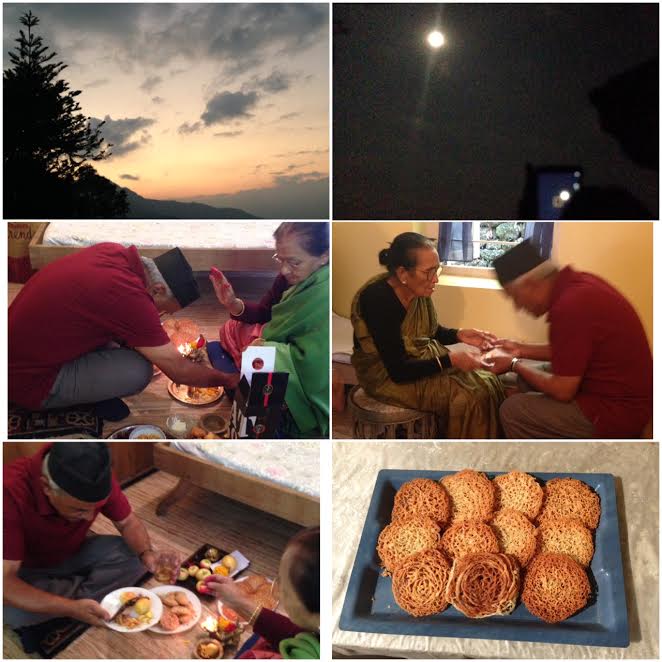Rejuvenating Super Moon
Active and alive
Rajiva Shanker Shresta
This time around when the country is in the grip of demonetization, Old age Blues was not something expected out of me entering Threshold Septuagenarian and beyond as Bidhan Mama remarked jovially. He was looking forward for one on the current topic that week. It would take some days more to get things settled down to normal. With stories of all sorts going around, I would like to throw light on some more positive notes on Old age Blues that would be of our interest and of use as well to many, perhaps. These are issues pertaining to health and well-being of the elderly people that I came across recently and thought why not share here:
Retirement does not mean a sedentary lifestyle. According to two separate studies, seniors who engage in moderate physical activity can considerably reduce their risk of heart disease and dementia.
For the study published in Journals of Gerontology, Medical Sciences, researchers analysed the physical acitivity of 3,714 participants aged 60 and older and followed them for over a decade, during which 236 people developed dementia. The most sedentary people were 50 per cent more likely to develop dementia compared to those who did any amount of exercise. Brain scans showed that those who exercised regularly had less brain shrinkage associated with ageing and more total brain volume.
"It doesn't require intensive physical activity to decrease risk of dementia. Even moderate amounts are fine," said the senior researcher.
Participants aged 75 or older showed the greatest benefits.
The message here is that you're never too old to exercise and gain benefit from it. These patients derive the most benefit from exercise because they are the ones who are at the age of greatest risk for dementia."
The second study presented at the annual meeting of the European Society of cardiology, analysed the health outcomes of almost 12 years. People who exercised at moderate levels had a 31 per cent lower risk for a cardio-vascular even such as a heart attack, and 54 per cent lower risk of dying during the study period. The protective benefits were even greater for those who engaged in high intensity activity. They had a 45 per cent lower risk of heart events, and a 66 per cent lower risk of death.
Adding to Ageing
Menopause and accompanying insomnia can accelerate ageing in women, according to two US studies. The menopause study published in the Proceedings of the National Academy of Sciences found that menopause speeds up cellular ageing in women by 6 per cent, increasing the risk of age related disease and even early death.
"It's like the chicken or the egg which came first? Our study is the first to demonstrate that menopause makes you age faster." said the lead author. The researchers measured the biological age by anlyzing DNA changes of cells from blood, saliva, and the inner cheek of more than 3,100 women and then compared this with their chronological age. A woman who began menopause at age 42 would be about one year older than a woman who began menopause at age 50.
The insomnia study published in the journal Biological Psychiatry found that sleeplessness that often accompanies menopause can also hasten biological ageing. When the cellular ageing of 2,078 women was assessed, the researchers found that women who experienced five symptoms of insomnia including restlessness, problem falling asleep, disrupted sleep, trouble getting back to sleep, and waking early were almost two years older biologically, compared to women of similar chronological age who did not have any sleep issues. "Not getting restorative sleep do more than just affect our functioning the next day, it might also influence the rate at which our biological clock ticks."said the first author of the study.
Alzheimer's disease
US researchers have developed a blood test that can detect Alzheimer's disease at an early stage referred to as the mild cognitive impairment (MCI) stage with 100 per cent accuracy. About 60 per cent of patients with MCI go on to develop Alzheimer's disease. MCI is seen about 10 years before severe symptoms of the disorder appear. The remaining 40 per cent of cases can be such as caused by other factors such as vascular issues, drug side-effects and depression.
"To provide proper care, physicians need to know which cases of MCI are due to early Alzheimer's and which are not," said the lead researcher. For the proof of concept study the researchers analyzed blood samples of 236 people including 50 with a diagnosis of MCI. They identified the top 50 auto-antibody biomarkers in the blood that can detect early stage Alzheimer's disease with an overall accuracy sensitivity and specificity rate of 100 per cent.
Early diagnosis of Alzheimer's disease could potentially help patients delay disease progression through lifestyle changes, begin treatment sooner and plan future medical care. The findings are published in Alzheimer's and Dementia: Diagnosis, Assessment & Disease Monitoring.
Vitamin D may reduce respiratory infections in the elderly
High doses of vitamin D are likely to reduce the incidence of acute respiratory illness in older adults, suggests a study led by an Indian-origin researcher.
The study found that among those who took higher doses of vitamin D, there was a 40 per cent reduction in acute respiratory illness — one of the leading causes of serious illness, debilitation and death among patients in nursing homes and other long-term care facilities.
“Vitamin D can improve the immune system’s ability to fight infections because it bolsters the first line of defense of the immune system,” said lead author Adit Ginde, professor at the University of Colorado, Denver, US.
“This is a potentially life-saving discovery. There is very little in a doctor’s arsenal to battle ARI, especially since most are viral infections where antibiotics don’t work. But vitamin D seems able to potentially prevent these infections,” Ginde added.
In older people that first line of defence is often impaired. But vitamin D can reinforce it and prevent illnesses like pneumonia, influenza and bronchitis, Ginde said.
It may also prevent infections and exacerbations of chronic obstructive pulmonary disease (COPD) like emphysema.
Conversely, Ginde found that those who received higher doses of vitamin D also saw an increase in falls
.
The falls were lower in those given smaller doses rather than higher monthly doses of vitamin D.
Vitamin D can prevent illnesses like pneumonia, influenza and bronchitis in older people. (Source: Thinkstock Images / Indian Express)
Advantage, Bookworm
"A chapter a day keeps the doctor away! Add reading to your daily routine and it will relieve stress, keep your mind sharp and help you live longer." For the study, published in the journal Social Science & Medicine, researchers at Yale University followed 3,635 people aged 50 or above, for 12 years. ... Book readers were generally women, more educated and earned more. Even after accounting for these and other factors, book readers lived about two years longer than non-readers. They enjoyed a 20 percent lower mortality risk over the course of the study. ... A similar, but weaker, link was seen among those who read newspapers and periodicals. These findings suggest that the benefits of reading books include a longer life in which to read them." the study concluded.
Most of the above information shared are from The Week, my 5-year subscription for which ends mid-January 2017 as they sent me reminder to renew yet again. Considering the benefits of reading newspapers and periodicals, the renewal is desirable even if lesser mortality risk expected but the greater is possibility of me sharing such latest information whenever an opportunity like this comes. Not necessarily that we might live to see the next Super Moon like this only in 2034 as well, as Bidhan Mama quipped! But again who knows!!
Disclaimer: This is author’s personal account of memories updated to cherish and treasure often on a detour here and there en route to share the joy of the journey called life. Some names (asterisk for those no more), quotes, places and events mentioned are just to connect with and no malice whatsoever intended. He can be reached at [email protected]. The Newars World~Wide Connecting the Dots Sikkim by the author is available at Rachna Books.



 RSS Feed
RSS Feed
